新视野大学英语第四版Unit1sectionB教案
新视野大学英语4第一单元sectionB单词

Translation
• 他没有喷农药来防治害虫或疾病。
• 农民们能用喷雾器来除草而不伤大豆作物。
Key
• He doesn't spray against pests or diseases.
• Farmers can use the spray to kill weeds without harming the soy crop.
Key
• Then we have to enquire what is time.
•I'll enquire about the train.
Words and Expressions—Word Using 5. coil [kɔɪl] vt. 盘绕,把…卷成圈 n. 线圈;卷 vi. 成圈状
a round shape formed by a series of concentric circles (as formed by leaves or flower petals)
to act in an acceptable way : to act properly;to act in a particular way 词组短语:behave oneself使举止规矩 behave well表现好;举止得体;行为检点;表现良好 behave yourself请检点一点,行为规矩些 behave properly行为正当
Words and Expressions—Word Using
10. furnish ['fɜːnɪʃ] vt. 提供;供应;装备
to provide (a room or building) with furniture;to supply or give (something) to someone or something 词组短语:furnish with 供给,提供;用…装 饰
新视野大学英语第四册教案unit1
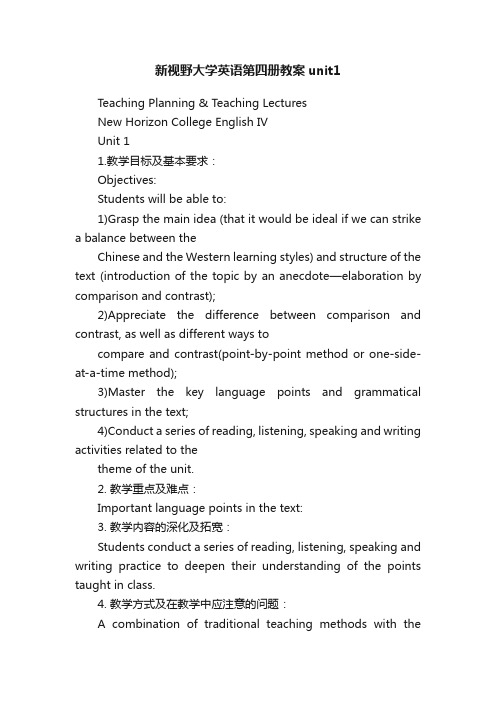
新视野大学英语第四册教案unit1Teaching Planning & Teaching LecturesNew Horizon College English IVUnit 11.教学目标及基本要求:Objectives:Students will be able to:1)Grasp the main idea (that it would be ideal if we can strikea balance between theChinese and the Western learning styles) and structure of the text (introduction of the topic by an anecdote—elaboration by comparison and contrast);2)Appreciate the difference between comparison and contrast, as well as different ways tocompare and contrast(point-by-point method or one-side-at-a-time method);3)Master the key language points and grammatical structures in the text;4)Conduct a series of reading, listening, speaking and writing activities related to thetheme of the unit.2. 教学重点及难点:Important language points in the text:3. 教学内容的深化及拓宽:Students conduct a series of reading, listening, speaking and writing practice to deepen their understanding of the points taught in class.4. 教学方式及在教学中应注意的问题:A combination of traditional teaching methods with thecommunicative approach will beadopted. Special attention should be paid to classroom interaction. Give students time to adapt to the new teaching mode in the university that are quite different from the one they were used to in the middle school. More encouragement is needed and more guidance will be given to them in their extracurricular study.5. 教学内容及学时分配:Time allotment:1st period: pre-reading; text organization2nd period: while-reading (Paras 1-5)3rd period: while-reading (Paras 6-13)4th period: while-reading (Paras 6-13 continued, Para 14)5th period: post-reading activities (Debate; Exercises)6th period: Check on students’ home reading (Text B); Theme- Related Language Learning T asks)6. 主要参考书目:郑树棠,胡全生,2003,《新视野大学英语综合教程4-教师用书》。
外研社2024教案-新视野大学英语(第四版)读写教程1(思政智慧版) Unit 4

《新视野大学英语(第四版)读写教程1》教案Unit 4 Social media matters一、单元教学概况(一)教学目标1. 知识目标(1)语言层面:学生能够学会并使用本单元重点词汇、短语、句型结构,并能够掌握主题相关词汇。
(2)内容层面:学生能够理解社交媒体对社会和个人生活的影响及社交媒体使用中可能出现的问题。
2. 能力目标(1)词汇应用能力:学生能够使用主题相关词汇进行话题内容阐述。
• 学生能够进行有关社交媒体的讨论,意思表达准确,词汇丰富。
• 学生能够对社交媒体的影响进行评估,同时能够就有关观点进行分析评价。
(2)阅读能力:学生能够理解分析有关社交媒体的讨论和案例研究,提取关键信息。
(3)写作能力:学生能够就社交媒体的利弊进行讨论,表达清晰,逻辑性强,并使用准确、丰富的标记词汇。
(4)应用能力:学生能够制作一个可上传社交媒体的短视频,介绍和传播中国文化。
学生需要撰写脚本并完成短视频制作。
(5)思辨能力:学生能够反思自己使用社交媒体的情况,并能分析判断社交媒体的影响,认识其正面和负面影响。
3.思政育人目标学生能够正确认识和使用社交媒体,培养良好的网络道德,进行积极健康的社交活动;在使用社交网络时,积极传播正能量,共创安全健康的网络环境。
(二)教学基本内容本单元聚焦“社交媒体”主题,围绕三篇“社交媒体”主题相关的阅读素材,进行相关内容、词汇、技能等层面的学习,并在单元最后,应用单元所学,完成一篇介绍中国文化的媒体作品。
本单元三篇学习素材各有侧重,旨在从不同维度加深学生对于社交媒体的思考:Text A通过案例探讨社交媒体对个人心理健康的影响,Text B从个人经历出发讨论社交媒体在维持人际联系中的作用,Text C描述了社交媒体如何成为中国人日常生活的一部分。
1. 词汇(1)重点词汇:addict/addition, depression, cyberbullying, compromise, impact, psychology, communication, considerable, influence, survive, obsession, interfere, withdrawal, encounter, access, promotion, significant, essential, preliminary, be headed for, contribute to, in particular, as for, thanks to(2)主题相关词汇:social media:addition, mental health, information, network, profile, follow, trend, viral, hashtag ... verbs of this topic: post, share, tag, mention, retweet, engage, ...adjectives of this topic: beneficial, informative, convenient ...; additive, deceptive, superficial ...; diverse, influential, ambiguous ...2.技能• 阅读技能:介绍重要的阅读策略“标记词”。
新视野大学英语视听说教程教案第四册unit1

Difficult Points
Making and accepting suggestions;
Teaching
Methods &
Techniques
Introduction ; Student–oriented listening & speaking method
Further listening & Speaking
1. Mention at least three reasons people get angry. What can we do to control our anger?
People tend to get angry when treated unfairly. Specifically, we may fly into a rage when we realize we were betrayed by a close friend or tricked by a clerk into buying something unnecessary at a high price. When people treat us with contempt, or deliberately ignore us, we may get annoyed. ‘also the sight of injustice often fills us with indignation. For instance, when we see a child being bullied by a group of hoodlums, it makes our blood boil.
新视野大学英语读写教程教学大纲B1-unit1-2
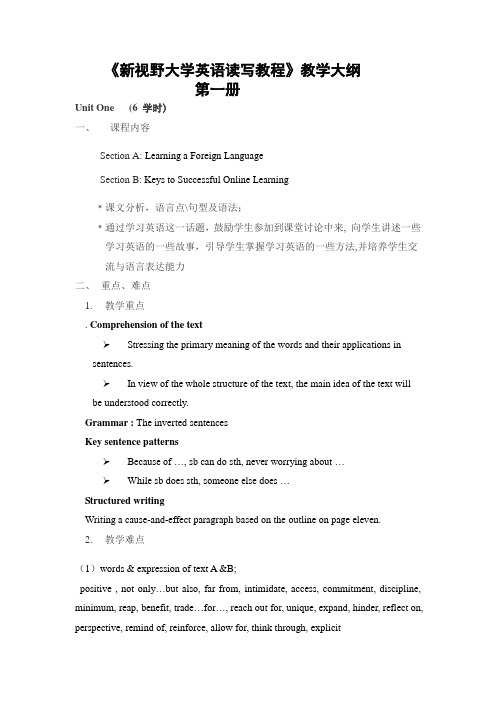
《新视野大学英语读写教程》教学大纲第一册Unit One (6 学时)一、课程内容Section A: Learning a Foreign LanguageSection B: Keys to Successful Online Learning﹡课文分析,语言点\句型及语法;﹡通过学习英语这一话题,鼓励学生参加到课堂讨论中来, 向学生讲述一些学习英语的一些故事,引导学生掌握学习英语的一些方法,并培养学生交流与语言表达能力二、重点、难点1. 教学重点. Comprehension of the textStressing the primary meaning of the words and their applications insentences.In view of the whole structure of the text, the main idea of the text will be understood correctly.Grammar : The inverted sentencesKey sentence patternsBecause of …, sb can do sth, never worrying about …While sb does sth, someone else does …Structured writingWriting a cause-and-effect paragraph based on the outline on page eleven.2. 教学难点(1)words & expression of text A &B;positive , not only…but also, far from, intimidate, access, commitment, discipline, minimum, reap, benefit, trade…for…, reach out for, unique, expand, hinder, reflect on, perspective, remind of, reinforce, allow for, think through, explicit(2)Sentence structure:Because of …, sb can do sth, never worrying about …While sb does sth, someone else does …(3)Reading skill—Finding out Word Meanings(4)基本要求了解一些有关学习英语的方法;理解课文含义;掌握本课重点词汇、短语及语法,能听懂本课英语短文并理解中心大意和要点;能用本课所学词汇、短语进行听、说、读、写、译的语言活动。
新视野大学英语读写教程四Unit 1
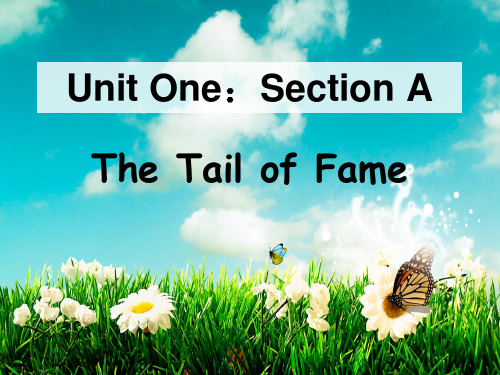
Steven Spielberg (1946-)
• 当地居民反对那个发展计划。
Local residents objects to the proposed development. 17. accuse sb. of sth. They accused him of incompetence.
New Words in Section A
18. justify vt. • It is difficult to justify such behavior. 19. single-minded a. a. + n.–ed 具有什么特征的 light-hearted; open-minded ; cold-hearted near-sighted; broad-minded 20. desperate a. • He is desperate for a job to support his family. 21. desperately ad. • She desperately wanted her article published.
西班牙人的气质明显有别于葡萄牙。
2) These are modern buildings with distinct national style.
这些是具有明显民族风格的现代建筑。
14. contaminate vt. • The food was contaminated during the production process.
这食品在生产过程中被污染。
New Words in Section A
15. underline vt. 1)All the mistakes had been underlined. 2) He underlined the importance of the question. 16. object vi. object to
新视野大学英语4第四版Unit1sectio
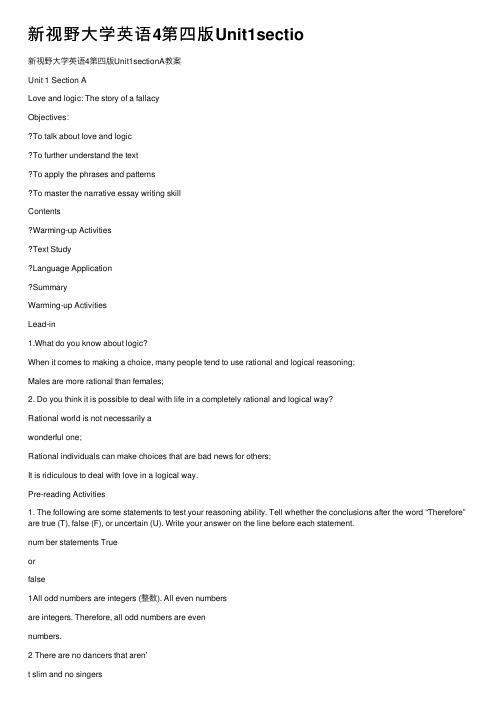
新视野⼤学英语4第四版Unit1sectio新视野⼤学英语4第四版Unit1sectionA教案Unit 1 Section ALove and logic: The story of a fallacyObjectives:To talk about love and logicTo further understand the textTo apply the phrases and patternsTo master the narrative essay writing skillContentsWarming-up ActivitiesText StudyLanguage ApplicationSummaryWarming-up ActivitiesLead-in1.What do you know about logic?When it comes to making a choice, many people tend to use rational and logical reasoning;Males are more rational than females;2. Do you think it is possible to deal with life in a completely rational and logical way?Rational world is not necessarily awonderful one;Rational individuals can make choices that are bad news for others;It is ridiculous to deal with love in a logical way.Pre-reading Activities1. The following are some statements to test your reasoning ability. Tell whether the conclusions after the word “Therefore”are true (T), false (F), or uncertain (U). Write your answer on the line before each statement.num ber statements Trueorfalse1All odd numbers are integers (整数). All even numbersare integers. Therefore, all odd numbers are evennumbers.2 There are no dancers that aren’t slim and no singersthat aren’t dancers. Therefore, all singers are slim.3 A toothpick (⽛签) is useful. Useful things are valuable. Therefore, atoothpick is valuable.Three pencils cost the same as two erasers. Fourerasers cost thesame as one ruler. Therefore, pencilsare more expensivethan rulers.5 Class A has a higher enrollment than Class B. Class C has a lowerenrollment than Class B. Therefore,Class A has a lower enrollment than Class C.6 A fruit basket contains more apples than lemons.There are morelemons in the basket than oranges.Therefore, thebasket contains more apples thanoranges.7 Taking the train across town is quicker than takingthe bus. Taking thebus across town is slower than driving a car.Therefore, taking the trainacross townis quicker thandriving a car.8 All the tulips in Zoe’s gardenare white. All the rosesin Zoe’s garden areyellow. Therefore, all theflowersin Zoe’s garden areeither white or yellow.2. Listen to a short passage on logic, and fill in the missing information. Cultural Background- Logic and Fallacy1. What is a fallacy? And how is it used?An error in reasoning that renders an argument logically invalid;By accident or design, logical fallacies are often used in debate or propaganda; To mislead people;To distract people from the real issue for the purpose of winning an argument.2. How many types of fallacy do you know?Red Herring (转移话题)/Begging theQuestion(循环论证)/Slippery Slope(滑坡谬误)/Bandwagon (从众谬误)/False Dilemma (伪两难谬误)/FalseCause (post hoc) (假因谬误)/AdHominem ( ⼈⾝攻击)/Appeal toAuthority (诉诸权威)/DictoSimpliciter (绝对判断)/HastyGeneralization (草率结论)/AdMisericordiam (⽂不对题)/FalseAnalogy (错误类⽐)Text Study1. Main idea and structureWhat did the narrator do with his roommateRob? (Para.1)They made a deal that the narratorgives Rob his leather jacket, and Rob,in exchange, gives the narrator hisgirlfriend.Why did the narrator want to have Polly ashis girl friend? (Paras. 2-3)Pretty, well-off, radiant;The right background to be the girlfriend of a dogged, brilliant lawyer;Help the narrator in his competition with other applicants to some elite law firms.●Part I — Paras. 1–3The author sets the scene of the story by providing information about the four “wh-” words: who, where, what, and why. “Who”refers to the narrator, his roommate Rob, and the beautiful girl Polly. “Where”refers to . “What”and “why” refer to what to do and why to do it: The narrator decides to make Polly “”because as a promisingly brilliant lawyer, he wants to have a girlfriend who is not only beautiful but also intelligent.●Part II — Paras. 4-25The narrator tries to help Polly become smarter by giving her lessons in logic. Altogether he spends five nights teaching Polly four logical fallacies , namely, Dicto Simpliciter,Hasty Generalization , Ad Misericordiam, False Analogy.●Part III — Paras. 26-43When asked to be the narrator’s girl friend, Polly refutes his arguments with the exact logical fallacies taught by him and refuses by making full disclosure that she is datingthe narrator simply because it is a trick she and Rob have decided to play on him in order to get his leather jacket .2. Structure of the textIntroduction to the story.The narrator and Rob make a deal: the exchange of a leather jacket for Polly. (Para. 1)Polly has some basicqualities to be the girlfriendof a lawyer.(Para. 2)Polly needs to be mademore intelligent. (Para. 3)Body (Development of the story)Why logic is important (Para. 4-8)The first logicalfallacy taughtto Polly: DictoSimpliciter(Paras. 9-11)e second logicalfallacy taughtto Polly: HastyGeneralization(Paras. 12-15)The third logicalfallacy taught toPolly: AdMisericordiam(Paras. 16-21)The fourthlogical fallacytaught to Polly:False Analogy(Paras. 22-25)3. Summary of the textClimax & End“We make a pretty good couple.”HastyGeneraliza-tio n. (Paras. 26-30)“You don ’t have to eat a whole cake to know it ’s good.” False Analogy.(Paras. 31-32)“Please say you ’ll go out with me. I ’m nothing without you.” AdMisericordiam. (Paras. 33-35)“You know the things you learn in school don ’t have anything to do with real life.” Dicto Simpliciter. (Paras. 36-37) Climax of the story: Polly refuses to be the narrator ’s girlfriend.(Paras. 38-43) Love and logic: The story of a fallacyMy roommate Rob made a pact with me that he’d give me his girlfriend Polly in exchange for my jacket. And I agreed. Polly had the right background to be the girlfriend of a dogged, brilliant lawyer like4. Practical phrasesPractical Phrases Specific Meanings Examples1. In exchange for…作为对……的交换In exchange for a peacefulenvironment for the futuregenerations, our revolutionarypredecessors shed their blood andeven sacrificed their precious lives.2. Set a date for为……定⽇期In order to achieve success, one hadbetter start immediately rather thanset dates for his/her efforts.3. Appeal to唤起;吸引This university boasts manyworld-famous experts, professors,and the world’s best researchlibrary, therefore, it appeals tostudents and researchers from allover the world.4. make/draw an analo gy between 在……之间作类⽐We often make an analogy betweenstudying and climbing a mountain:both of them require great effortsbefore you can reach the top.5. Make sth. out of sb./sth.使……变成……The aim of the military academy is to make qualified officers out of the young cadets after four years’ study and training.6. Give sb. the axe抛弃(恋⼈);解雇If you continue playing yourprecious college years away, successwill give you the axe upongraduation.7. Be dripping with …满是……Though the beautiful lady isdripping with jewels, her words andactions are dripping with vulgarityand rudeness.5. Functional patternsFunctional Patterns Functions & Usages Examples1. If sb. could do …,sb. just might do …⽤于表达“假设”如果我能够让我所申请的顶尖律师事务所看到我⾝边伴随着⼀位光彩照⼈、谈吐优雅的另⼀半,我就很有可能在竞聘中以微弱优势获胜。
新视野大学英语1 电子优秀教案U1B1

学时
教案目的
1.To talk about college English learning。
2. To talk about college education。
3. To apply the words and phrases。
4. To master the speech writing skills。
Guide the Ss to master the writing skill: A topic sentence supported by details.
Unit 1 Fresh Start
I. Greet & introduction
1. Greet and introduce each other
•valuable life lessons, such as teamwork, leadership, or civic (公民) responsibility.
III. Text study
1.Read through the passage to get the main idea of it.
Try not to be a man of success, but rather try to become a man of value.
Section A Toward a brighter future for all
II.Warming up activities
1.Lead-in Questions
5. Detailed study of the text (85’):
6. Summary of the text. (10’)
7. Exercises. (20’)
新视野大学英语 Unit1 sectionB

Desalination, or the removal of salt from seawater, is a method of providing fresh water for business, home, and agricultural use. “The removal of salt from seawater” is the definition of “desalination”.
to be continued
随
笔
Practice
课文
自测
NHCE
There are other ways to help you find out word meanings in context. Please try and use the skills in your reading.
随
笔
Practice
This practice is designed to help you get a deeper insight into the skill for this unit.
NHCE
课文
自测
Finding out Word Meanings
Hi, everyone. We’ve come to Section B. This section deals with Reading Skills wherein we will introduce several important reading skills one by one. You should take care to read the explanation of each specific skill, which has been written in clear, easy-to-understand words. And through Reading Passage B we will let you see how each skill is applied to a particular passage.
新视野大学英语1电子教案U1B

Toward a Brighter Future for All
Good afternoon! As president of the university, I am proud to ___________ you to this university. Your current achievement is the __________ of years of hard work. Here, you may encounter things you do not expect. But remember: Your future success is built on a solid ____________ of the past.
作业及
思考题
Exercise 3,4,5, 6, 7 on Page 9-12.
Exercise 9, 10,11 on page 14-15
参考资料
NewHorizonCollegeEnglish ,3rd Edition, Book 1
本讲内容学法指导
Guide the Ss to set a proper goal for life.
•To cherish the college experience;
•To make use of the opportunities for learning;
•To develop more interests;
•To read as widely as possible
2.Pre-reading activities
•valuable life lessons, such as teamwork, leadership, or civic (公民) responsibility.
新视野大学英语第四册教案完整版
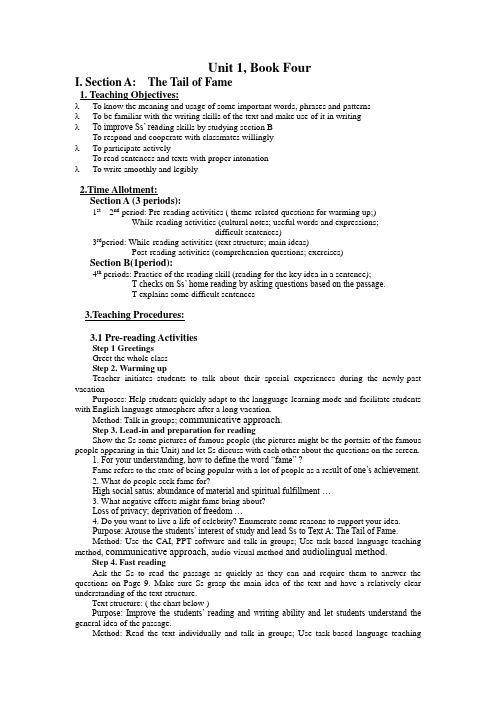
Unit 1, Book FourI. Section A: The Tail of Fame1. Teaching Objectives:λTo know the meaning and usage of some important words, phrases and patternsλTo be familiar with the writing skills of the text and make use of it in writingλTo improve Ss’ rea ding skills by studying section BTo respond and cooperate with classmates willinglyλTo participate activelyTo read sentences and texts with proper intonationλTo write smoothly and legibly2.Time Allotment:Section A (3 periods):1st---2nd period: Pre-reading activities ( theme-related questions for warming up;)While-reading activities (cultural notes; useful words and expressions;difficult sentences)3rd period: While-reading activities (text structure; main ideas)Post-reading activities (comprehension questions; exercises)Section B(1period):4th periods: Practice of the reading skill (reading for the key idea in a sentence);T checks on Ss’ home reading by asking questions based on the passage.T explains some difficult sentences3.Teaching Procedures:3.1 Pre-reading ActivitiesStep 1 GreetingsGreet the whole classStep 2. Warming upTeacher initiates students to talk about their special experiences during the newly-past vacationPurposes: Help students quickly adapt to the langguage-learning mode and facilitate students with English language atmosphere after a long vacation.Method: Talk in groups; communicative approach.Step 3. Lead-in and preparation for readingShow the Ss some pictures of famous people (the pictures might be the portaits of the famous people appearing in this Unit) and let Ss discuss with each other about the questions on the screen.1. For your understanding, how to define the word “fame” ?Fame refers to the state of being popular with a lot of people as a res ult of one’s achievement.2. What do people seek fame for?High social satus; abundance of material and spiritual fulfillment …3. What negative effects might fame bring about?Loss of privacy; deprivation of freedom …4. Do you want to live a life of celebrity? Enumerate some reasons to support your idea.Purpose: Arouse the students’ interest of study and lead Ss to Text A: The Tail of Fame.Method: Use the CAI, PPT software and talk in groups; Use task-based language teaching method, communicative approach, audio-visual method and audiolingual method.Step 4. Fast readingAsk the Ss to read the passage as quickly as they can and require them to answer the questions on Page 9. Make sure Ss grasp the main idea of the text and have a relatively clear understanding of the text structure.Text structure: ( the chart below )Purpose: Improve the students’ reading and writing ability and let students understand the general idea of the passage.Method: Read the text individually and talk in groups; Use task-based language teachingmethod, reading approach, communicative approach and total physical response method.Step 5. Preparation for details of the text on the screenSs are required to look at the words and phrases on the screen and give a brief presentation in class.Words and Phrases:Purpose:Train the Ss’ ability of understandi ng and using foreign language.Method: Talk in groups, Use task-based language teaching method, communicative approach and total physical response method.1)bankrupt: adj. without enough money to pay what one owesMany state-owned enterprises have gone bankrupt. 许多国有企业都破产了。
新视野大学英语读写1第一课SectionB市公开课获奖课件省名师示范课获奖课件

11
Reading Skills
3. By the opposite of the word
e.g.
Jane was talking with others while Eliza remained reticent all the time.
11
Reading Skills
6. By examples
e.g.
Select any of these periodicals: Times, Newsweek or Reader’s Digest.
q Key
a magazine which comes out at regular times 期刊,杂志
1. Be open-minded about sharing life, work, and learning experiences as part of online learning.
2. Be able to communicate through writing. 3. Be willing to “speak up” if problems arise. 4. Take the program seriously. 5. Make critical thinking and decision part of online
A. collect C. learn
B. improve D. receive
4. Aristophanes said, “By words, the mind is excited and the spirit elated.”
A. filled with joy C. lifted
Unite 1 Section B新视野大学英语
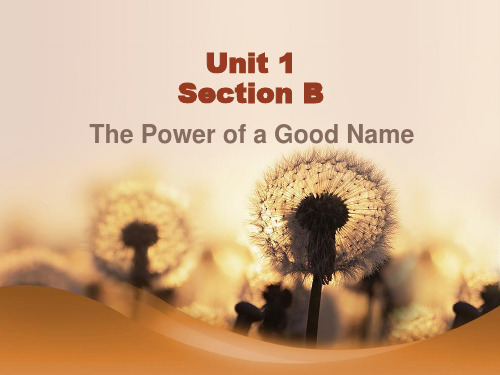
4. What does America need to restore a sense of shame in its neighborhoods?
T
1.F 2.T 3.F 4.T 5.T 6.T 7.F 8.T
Vocabulary 1 . melted 2. restore 3. initiative 4. obligation 5. induce 6. lest 7. relief 8. furnish 9. enquire 10. meanwhile IV 1. kept his word 2: shrugged off 3. melted away 4. enquire into 5. cool off 6. pave the way for7. hold up 8. fall apart
It means that the man was diffrernt from others for he was honest and paid debts.
3.The farmer first gave “me” an amused, cynical look and then nodded at “me” in a neighborly way. What does that imply?
9. wipe away 10. on credit
Unit 1 Section B
The Power of a Good Name
(完整word版)新视野大学英语第四册第一单元教案

Unit1TheFirstTwoPeriodsStep 1: Warm—up 20m Questioning & DiscussingStep2: Structure10m LecturingStep 3: Language points and DifficultSentences30mLecturing, Questioning& Giving Examples Step 4: Comprehension of the Text15m Questioning & DiscussingStep 5: Text Structure Analysis(Writing Ways Mentioned in thePassage in Section A)10m LecturingStep 6: Summarize the passage orally10m Questioning & DiscussingStep 7: Homework5m LecturingTheSecondPeriodsStep 1: Revision of the key words andphrases in Section A10mLecturing, Questioning &Giving Examples Step 2: Exercises (Vocabulary,Translation, Essay Summary in SectionA)35m Questioning & Discussing Step 3: Reading Skills (The Passagein Section B)50mLecturing, Questioning& Giving Examples Step 4: Homework Assignment5m LecturingTheThirdTwoPeriodsStep 1:Revision of the readingskills, key words and phrases inSection B10mLecturing, Questioning& Giving Examples Step 2: Test One (自主测试)15m Questioning & DiscussingStep 3: Listening40mListening &QuestioningStep 4: Speaking30m Questioning & DiscussingStep 5: Homework Assignment5m Lecturing教学过程The First Two PeriodsStep 1: Warm—up (20m)1. What is temptation? Do you have the experience of being tempted? 2。
新视野大学英语4unit1教案
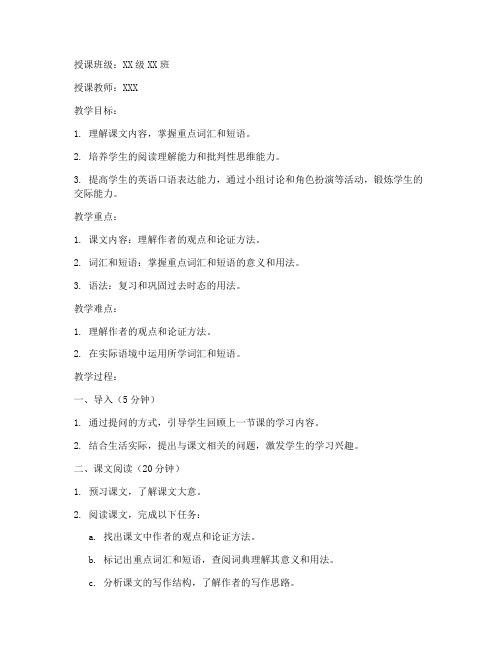
授课班级:XX级XX班授课教师:XXX教学目标:1. 理解课文内容,掌握重点词汇和短语。
2. 培养学生的阅读理解能力和批判性思维能力。
3. 提高学生的英语口语表达能力,通过小组讨论和角色扮演等活动,锻炼学生的交际能力。
教学重点:1. 课文内容:理解作者的观点和论证方法。
2. 词汇和短语:掌握重点词汇和短语的意义和用法。
3. 语法:复习和巩固过去时态的用法。
教学难点:1. 理解作者的观点和论证方法。
2. 在实际语境中运用所学词汇和短语。
教学过程:一、导入(5分钟)1. 通过提问的方式,引导学生回顾上一节课的学习内容。
2. 结合生活实际,提出与课文相关的问题,激发学生的学习兴趣。
二、课文阅读(20分钟)1. 预习课文,了解课文大意。
2. 阅读课文,完成以下任务:a. 找出课文中作者的观点和论证方法。
b. 标记出重点词汇和短语,查阅词典理解其意义和用法。
c. 分析课文的写作结构,了解作者的写作思路。
三、课堂讨论(15分钟)1. 小组讨论:针对课文内容,进行深入讨论,分享自己的观点和看法。
2. 教师点评:针对学生的讨论,进行点评和总结,强调重点和难点。
四、词汇和短语学习(10分钟)1. 列举课文中的重点词汇和短语,进行讲解和示范。
2. 学生跟读,练习发音和用法。
3. 进行词汇和短语的应用练习,巩固所学知识。
五、语法讲解(10分钟)1. 复习和巩固过去时态的用法。
2. 通过例句和练习,让学生熟练掌握过去时态的构成和用法。
六、角色扮演(10分钟)1. 将学生分成小组,根据课文内容进行角色扮演。
2. 学生通过角色扮演,提高口语表达能力,锻炼交际能力。
七、总结(5分钟)1. 教师总结本节课的学习内容,强调重点和难点。
2. 学生回顾本节课的学习内容,提出疑问。
教学评价:1. 课后作业:完成课后练习,巩固所学知识。
2. 小组讨论:观察学生在小组讨论中的表现,评价其批判性思维能力和交际能力。
3. 角色扮演:评价学生在角色扮演中的表现,评价其口语表达能力和交际能力。
新视野大学英语第四册第一单元教案
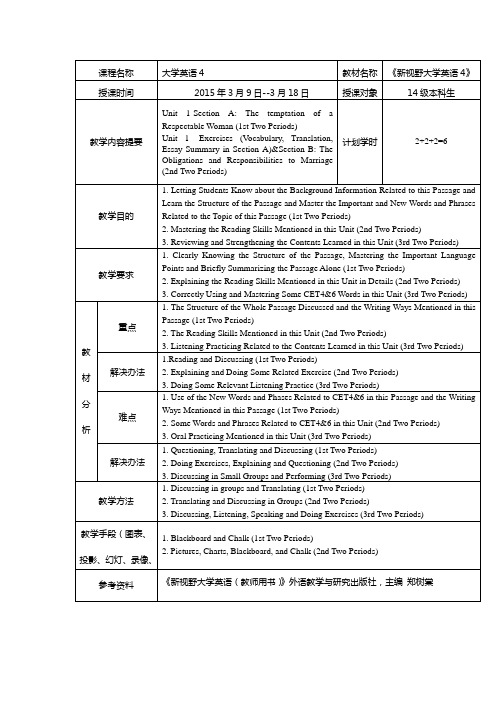
课堂设计主要内容拟用表达方式Unit1 TheFirstTwoPeriodsStep 1: Warm-up 20m Questioning & DiscussingStep2: Structure 10m LecturingStep 3: Language points and Difficult Sentences 30mLecturing, Questioning &Giving Examples Step 4: Comprehension of the Text 15m Questioning & DiscussingStep 5: Text Structure Analysis (Writing WaysMentioned in the Passage in Section A)10m LecturingStep 6: Summarize the passage orally 10m Questioning & DiscussingStep 7: Homework 5m LecturingTheSecondPeriodsStep 1: Revision of the key words and phrases inSection A10mLecturing, Questioning &Giving Examples Step 2: Exercises (V ocabulary, Translation, EssaySummary in Section A)35m Questioning & Discussing Step 3: Reading Skills (The Passage in Section B) 50mLecturing, Questioning &Giving Examples Step 4: Homework Assignment 5m LecturingTheThirdTwoPeriodsStep 1: Revision of the reading skills, key wordsand phrases in Section B10mLecturing, Questioning &Giving Examples Step 2: Test One (自主测试)15m Questioning & DiscussingStep 3: Listening 40m Listening & QuestioningStep 4: Speaking 30m Questioning & DiscussingStep 5: Homework Assignment 5m Lecturing教学过程The First Two PeriodsStep 1: Warm-up (20m)1. What is temptation? Do you have the experience of being tempted?2. If you were a married man or woman, you find a man or a woman who is very attractive to you, what would you do?3. How do you deal with a quiet stranger? Are you a sensible person or an emotional person? What is your moral standard?Step2: Structure (10m)Part I (Para 1): The general situation of the story, also the starting point of the story. Mrs. Baroda was a little annoyed that her husband’s friend--- Gouvernail, was to spend a week or two on their plantation.Part II (Paras2—10): What happened and Mrs. Baroda’s impressions of her guest.Part III (Para 11--19): What happened that night and some sort of emotional change in Mrs. Baroda but all this came along with a succession of actions.Part IV (Par20): What happened the day after “that night”. Next morning, Mrs. Baroda took an early train without even saying farewell. She did not return until Gouvernail was gonePart V (Par21): What happened during the time after “that night”. Durin g the summer that followed, Mr. Baroda greatly desired that his friend come to visit them again but this was vigorously opposed by Mrs. Baroda.Part VI (Par22--24): Before the year ended, Mr. Baroda was surprised and delighted to hear that Mrs. Baroda proposed to have Gouvernail visit them again as she had overcome everything--- the temptation.Step 3: Language points and Difficult Sentences (30m)Part I: Difficult Words and Phrases1. temptation :un. the action of tempting sb. or the state of being temptede.g. If you can’t resist buying things, shop by telephone to avoid temptation.cn. a thing that tempts or attracts sb.e.g. The bag of sweets on the table was too strong a temptation for the child to resist.e.g. Clever advertisements are just temptations to spend money.tempt : v. 1) persuade or try to persuade sb to do sth wrong or foolishe.g. He was tempted into making a false step.2) attract sb to have or do sthe.g. The warm weather tempted us to go for a swim.2. for the most part : in most cases; mostly (Para.2)e.g. For the most part the children are very healthy.e.g. The people of this town are , for the most part , quiet and well-behaved.3. Then she imposed her company upon him … (Para.2)impose one’s company/ones elf upon sb: force one’s company or oneself on sbe.g. Don’t impose your company on people who don’t want you .4. idle : adj. (Para.2)1) having no particular purposee.g. I don’t know why I asked – just idle curiosity .2) lazy; wasting time The First Two PeriodsStep 3: Language points and Difficult SentencesPart I: Difficult Words and Phrases 18. …of the days of keen ambitions and large intentions… (Para.16)keen :adj.1) extreme; strong; activee.g. He took a keen interest in domestic affairs.e.g. The children watched the clowns with keen delight. 2) eager; anxious to do things (on)e.g. He wasn’t keen on buying a car, but we talked him into it.e.g. He is very keen on the girl next door. syn : eager, anxious 3) (of points and edges) sharpe.g. The knife was old, but the blade had a keen edge. 4) active ; sensitive; sharpe.g. He had always kept a keen eye on what was happening around.syn: acute, aware, sensitive19. His words became ae.g. He is an idle, useless student .3) not working or operating productivelye.g. Owing to the electricity strike, a lot of factory workers were left idle .e.g. During the business depression half the machines in the factory were idle .5. …to press her atte mpt to penetrate the silence …(Para.2)penetrate : v. move into or throughe.g. Our eyes could not penetrate the darkness .e.g. Not many people managed to penetrate my disguise .penetration : n. the act or process of penetratinge.g. The company has had a successful first year at home but penetration of the international market has been slow .e.g. The heavier the arrow, the greater its penetration into the target.penetrative : adj. able to penetrate easily; intelligente.g. This is a penetrative analysis.compare:penetrating: a. (of the eye, sight, a question, etc)sharp and searching; (of a person, the mind, etc.) able to understand clearly and deeply; (of a sound) sharp and loude.g. He had an extraordinarily penetrating gaze.e.g. I was trying to think up another penetrating question.e.g. Her voice is so harsh and penetrating.6. for my part : as far as I am concerned; speaking for myself (Para.3)e.g. For my part, I don’t care who wins.e.g. I for my part still distrust you.7. …gathered h is arms around her waist and looked merrily into her troubled eyes . (Para.6)merrily : adv. in a cheerful way; cheerfullye.g. The children are playing in the garden merrily.merry : adj. happy; cheerful; bright and gaye.g. He wished them all a merry Christmas.e.g. We had a merry time at the party.8. “ Even I can never count upon how you are going to act under given conditions …”(Para.7)count upon / on : expect ; depend one.g. I didn’t count on John arriving so early.e.g. She can always be counted on for support.9. “ taking poor Gouvernail seriously and making a fuss about him …”(Para.7)make a fuss about : complain stronglye.g. I’m going to have to make a fuss about the service in this restaurant .e.g. There’s no point making a fuss about i t.10.But the poor fellow is run down by too much work now.(Para.9)run down : tire ; (cause to) be in an increasingly worse conditione.g. He is run down from working too hard.e.g. British manufacturing industry has been running down for years.11.“ You used to say he was a man of wit,” (Para.10)meaningless succession of verbs , nouns , adverbs … (Para.17)a succession of :a series ofe.g. A succession of one-man stalls offered soft drinks.e.g. The worst misfortune that befell her was to bear a succession of girls.20. …she only drank in the tones of his voice. (Para.17)drink in : be eager to accept (words or ideas) ; listen with attention toe.g. They drank in the sights and sounds of the city. e.g. The boy drank in every word of the sailor’s story of his adventures.21. But she did not yield to the temptation.yield to : give way ; cease opposition e.g. We will never yield to force.e.g. The government has not yielded to public opinion. 22. Besides being an upright and respectable woman she was also a very sensible one.wit : 1) un. clever and humorous expression of idease.g. Our teacher’s conversation is full of wit.e.g.His writings sparkle with wit.2) cn. a person who is skilled in using words in a clever and humorous waye.g. Oscar Wilde was a famous wit.3) n. intelligencee.g. A fall into the pit, a gain in your wit .e.g. When she heard the explosion, she had the wit to telephone the police immediately.12. …that she might object to his presence. (Para.12)object to: opposee.g. I object to the plan on the grounds that it is too expensive.e.g. I strongly object to being treated like a child.13. …handing her a length of sheer white fabric …(Para.13)sheer:adj. 1) finely woven and almost transparente.g. sheer silk / sheer stockings2) complete ; thoroughe.g. He won his position by sheer ability.e.g. Such behavior was sheer foolishness.syn: absolute , complete , perfect , pure3) very steep ; almost verticale.g. The cliff is absolutely sheer.syn : steep, vertical14. He made some routine observations…(Para.14)observation:cn. remark or commente.g. She made some interesting observations on the current political scene.e.g. I wish to make a few general observations about your work so far.n. action of noticing or watchinge.g. This telescope is used for the observation of distant stars.e.g. The experiment is complicated and requires careful observation.observe : v. 1) watch carefullye.g. She observed a man walking on the opposite side of the way.syn : spy , note , notice , see , view2) pay attention to (rules)e.g. This law has been faithfully observed by the Italian government.3) remarke.g. The speaker observed that times had changed.15. Then as his gaze reached out into the darkness …(Para.14)gaze : n. long , steady looke.g. She turned her worried gaze from one person to the other.e.g. He turned his head away , feeling too ashamed to meet her gaze.v. look steadilye.g. She sat gazing out of the window.16. Gouvernail was in no sense a shy man . (Para.15)in no sense :not…at all (Para.19)upright : adj.1) honest , responsible and morale.g. An upright person is one who completely honest and fair.e.g. Beneath their upright dignity, the people were , at heart , warm and kindly.syn : honest , honourable2) in a vertical position ; erecte.g. There is only an upright piano in the room.e.g. I cannot stand upright any more. syn: erect , upstandingadv. straight up ; not bente.g. He placed the books upright in the bookcase.23. …but this desire yielded to his honorable wife’s vigorous opposition . (Para.21) honorable :adj. deserving , bringing or showing honor and respecte.g. The soldier received an honorable discharge at the end of the war.e.g. All work ise.g. They have in no sense been elected to represent the nation.compare :in a sense : partlye.g. You are right in a sense , but you don’t know all the facts.in one’s senses :in one’s normal state of min d ; sensiblee.g. No one in their right senses would let a small child go out alone.17. …his silence melted for the time .(Para.15)melt : v. 1) slowly go away or disappeare.g. The ship melted into the darkness.e.g. I don’t know where my money goes – it just seems to melt away.2) cause to become liquide.g. The snow soon melted away when the sun come out.e.g. The ice will melt when the sun shines on it.syn : dissolvePart II: Difficult Sentences1. Mrs. Baroda was a little annoyed to learn that her husband expected his friend, Gouvernail, up to spend a week or two on the plantation. (Para.1)--------Mrs. Baroda felt a bit angry when she knew that her husband wanted his friend Gouvernail to spend a week or two on the farm.2. After a few days with him, she could understand him no batter than at first. (Para.2)--------After a few days with him on her plantation, she knew no more about Gouvernail than at the very beginning.3. She imposed her company upon him, accompanying him in his idle walks to the mill. (Para.2)--------She forced him to accept her company no matter whether he likes it or not, talking aimless walks with him to the mill.4. to press her attempt to penetrate the silence in which he had unconsciously covered himself.(Para 2)--------and she tried to understand the reserve in which he had enveloped himself unintentionally.5. For my part, I find him a terrible nuisance. (Para.3)--------As far as I’m concerned, he annoys me a lot.6. he went on, “ taking poor Gouvernail seriously and m aking a fuss about him, the last thing he would desire or expect. (Para.7)--------He continued saying that she was paying too much attention to Gouvernail and showing too much anxiety about him. That was what Gouvernail dislike.7. She could gather nothing from them but the feeling of a distinct necessity to leave her home the next morning ( Para.11)--------She could only feel that it was definitely necessary for her to leave her home the next morning.8. He made some routine observations upon the unhealthy effect of the night breeze at that season. ( Para. 14)--------He made some regular comments on the negative effect of the night breeze of that season on people’s health.honorable. compare : honorary :adj. given as an honour e.g. The Prince came to receive an honorary fellowship from the college. 24. …truly he did not deserve it. (Para.23)deserve : be worthy of ; be fit fore.g. He felt that her praise of him was deserved .e.g. I have devoted four weekends to writing papers and now I feel I deserve a rest.syn : merit , rate25. …after pressinga long , tender kiss upon his lips …(Para.24) tender: adj. 1) gentle and loving e.g. Be tender towards the children .e.g. She sent her lover a tender glance which was caught by her husband . syn: fond , gentle , loving , mild , soft 2) easy to bite through ; softe.g. a piece of tender meat / tender colours3) painful ; sore ; sensitive to the9. Then as his gaze reached out into the darkness, he began to talk. ( Para.14)--------Then as he looked into the dark, he began to talk.10. Now, all there was left with him was a desire to be permitted to exist, with now and then a little breath of genuine life, such as he was breathing now. ( Para. 16)--------Now, he only hoped to be allowed to live, enjoying the genuine life as he was doing just then from time to time.Step 4: Comprehension of the Text (15m)Exercise II: Answer the following questions.Step 5: Text Structure Analysis (Writing Ways Mentioned in this Passage) (10m) Step 6: Summarize the passage orally (10m)Step 7: Homework (5m)Finish the exercises in Section A and preview the passage in Section BThe Second Two PeriodsStep 1:Revision of the key words and phrases in Section A (10m)Step 2: Exercises (Vocabulary, Word Building, Essay Summary in Section A) (35m)1. Vocabulary (Exercise III & Exercise IV in this unit)2.Word Building (Exercise VI & Exercise VII in this unit)3.Essay Summary (Exercise XII in this unit)Step 3: Reading Skills (The Passage in Section B) (50m)1. Talking about the reading skills in this unit.2. Doing the Exercise about reading skills.3. Language points and Difficult SentencesPart I: Difficult Words:1.be subjected to = make somebody experience or undergoe.g. He was subjected to severe criticism.2.take offense = feel upset or insultede.g. I hope you must not take offense at my frankness.3.look back on = remember what has happened in the paste.g. I like to look back on my high- school days, which were among the happiest in my life.4.obligation = a duty; a law, a promise, an influence, etc.e.g. We are under an obligation to help.5.get out of hand = become uncontrollablee.g. The situation is get out of hand.6.guarantee = promise to do sth.e.g. Many shopkeepers guarantee satisfaction to customers.7.in conjunction with = together withe.g. The moon is in conjunction with the sun.8.at will = as one wishese.g. Because our army was weak, the enemy attached at will.9.elastic = able to be changed; not fixede.g. The rules are elastic. (喻)10.passion = a strong feeling of hate, love, or angere.g. He's been known to fly into a passion without warning. touche.g. The wound is still very tender . e.g. Don’t mention his divorce –it’s a very tender subject .4. Comprehension of the TextExercise XVI: Choose the best answer to each of the following questions.Step 4:Homework Assignment (5m)Finish Test One (自主测试)The Third Two PeriodsStep 1: Revision of the reading skills, key words and phrases in Section B (10m) Step 2: Test One (自主测试) (15m)Part I V ocabulary and StructureSection B & Section CStep 3: Listening (40m)Listening Exercises in Unit One in Listening And Speaking BookStep 4: Speaking (30m)Speaking Tasks in Unit One in Listening And Speaking BookStep 5: Homework Assignment (5m)Preview the words and phrases in Section A in Unit 2.。
新视野大学英语unit1 sectionB的课件
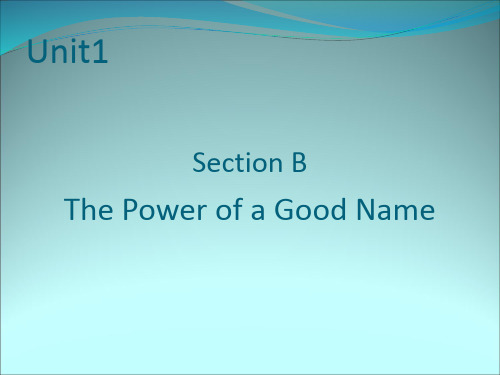
eg: The house has been lovingly restored to the way it looked in 1900 when it was built. 这房子已被精心修复 到1900年它建造时的样子。
1.vi. gradually disappear 逐渐消失 eg: Opposition to the government melted away. 对政府
的反对消失了。
2.v.become or make sth. become liquid as a result of heating (使)融化;(使)熔化
behave
vi. act in a particular way 举动;表现 eg: Whenever there was a full moon he would start
behaving strangely. 只要是有全月,他的举止就会开始 变得怪异了。 Ps: behavior n. 行为,举止,态度;
n.快乐,愉快,开朗
eg: She has brought some sunshine into my life.她给我 的生活带来了几分快乐。
Words:
bathe
vi. swim in the sea, a river, or a lake 游泳 eg: I like to bathe in the sea. 我喜欢在大海里游泳。 v. (BrE bath) wash oneself or sb. else in a bath (给...)
新视野大学英语第四版Unit1sectionB教案
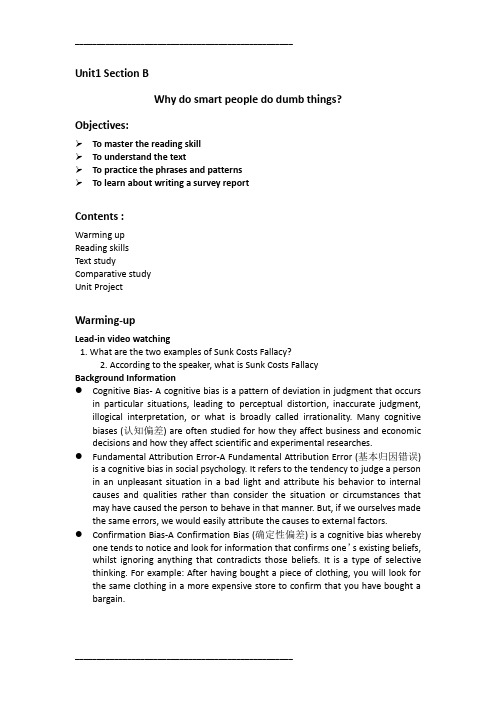
Unit1 Section BWhy do smart people do dumb things? Objectives:➢To master the reading skill➢To understand the text➢To practice the phrases and patterns➢To learn about writing a survey reportContents :Warming upReading skillsText studyComparative studyUnit ProjectWarming-upLead-in video watching1. What are the two examples of Sunk Costs Fallacy?2. According to the speaker, what is Sunk Costs FallacyBackground Information●Cognitive Bias- A cognitive bias is a pattern of deviation in judgment that occursin particular situations, leading to perceptual distortion, inaccurate judgment, illogical interpretation, or what is broadly called irrationality. Many cognitive biases (认知偏差) are often studied for how they affect business and economic decisions and how they affect scientific and experimental researches.●Fundamental Attribution Error-A Fundamental Attribution Error (基本归因错误)is a cognitive bias in social psychology. It refers to the tendency to judge a person in an unpleasant situation in a bad light and attribute his behavior to internal causes and qualities rather than consider the situation or circumstances that may have caused the person to behave in that manner. But, if we ourselves made the same errors, we would easily attribute the causes to external factors.●Confirmation Bias-A Confirmation Bias (确定性偏差) is a cognitive bias wherebyone tends to notice and look for information that confirms one’s existing beliefs, whilst ignoring anything that contradicts those beliefs. It is a type of selective thinking. For example: After having bought a piece of clothing, you will look for the same clothing in a more expensive store to confirm that you have bought a bargain.Reading skillsSkimming is a method of rapidly moving the eyes over a text with the purpose of getting themain idea or a general overview of its content. For example, many people skim read a newspaperarticle just to get a quick overview, or a text to see whether it’s worth reading in detail. The keyword for skimming is “general”.Steps to help you to skim an article1 Read the title –it is the shortest possible summary of the content of the article.2 Read the introduction or lead-in paragraph(s).3 Read any sub-headings, and identify the relationships between them.4 Read the first sentence of each remaining paragraph; the main idea of most paragraphsappears in the first sentencePracticeSkim Text B to find answers to the following questions.1 What is this text mainly about?2 What common cognitive biases can causesmart people to make bad decisions?3 How can we avoid being affected byvarious types of cognitive biases whenmaking a decision?Text StudyText Comprehension1.What is the traditional view about smart people according to Paragraph 1? (Para. 1)Smart people, by virtue of what they’ve learned, will formulate better decisions.2.What is the most typical characteristic of the fundamental attribution error? (Para.3)One of the most common biases is what is known as the fundamental attribution error. Through this people attribute the ______________ to _____________ and their own to ________________, subconsciously considering their own characters to be ________.3.What will you be affected if you are only interested in evidence that is in agreement with your ownbelief? (Para.5)The confirmation bias.5.Why does the availability bias leads to strange and inaccurate conclusions? (Para.8)Because it causes people to use evidence that is not so convincing and strong.6.Why don’t people want to leave a bad investment situation and commit the sunk costfallacy? (Para.11)Because they don’t want their previous investments to be wasted.7. What is the purpose of this text?The purpose of this text is try to help us learn about cognitive biases and be better at decision-making.Text SummaryPsychologists have uncovered cognitive biases are common to all people. One of the most common biases is_fundamental attribution error_. Through this people attribute the failures of others to character flaws and their own to mere __circumstance. __Confirmation_ bias is found together with fundamental attribution error. This one has two parts. First, people tend to gather and rely upon information that only confirms their existing views. Second, people avoid or veto things that refute their _pre-existing hypotheses__________. Similar to confirmation bias is the __overconfidence bias, Which means we could be correct 100 percent of the time we were ___100 percent sure_ about something, ____correct 80 percent__ of the time we were 80 percent sure about something. The availability bias is also related to _errors___ in estimation, In action this bias might lead someone to cancel a trip because of a report that the _biggest plane crash in history happened there_. The sunk cost fallacy can lead people to stay in damaging situations. The key to avoiding these biases remains the same: Rely on ___watertight logic__________, carefully examine the evidence and _____remain aware_______!Practical phrasesFunctional patterns。
- 1、下载文档前请自行甄别文档内容的完整性,平台不提供额外的编辑、内容补充、找答案等附加服务。
- 2、"仅部分预览"的文档,不可在线预览部分如存在完整性等问题,可反馈申请退款(可完整预览的文档不适用该条件!)。
- 3、如文档侵犯您的权益,请联系客服反馈,我们会尽快为您处理(人工客服工作时间:9:00-18:30)。
Unit1 Section BWhy do smart people do dumb things Objectives:To master the reading skillTo understand the textTo practice the phrases and patternsTo learn about writing a survey reportContents :Warming upReading skillsText studyComparative studyUnit ProjectWarming-upLead-in video watching1. What are the two examples of Sunk Costs Fallacy2. According to the speaker, what is Sunk Costs FallacyBackground InformationCognitive Bias- A cognitive bias is a pattern of deviation in judgment that occurs in particular situations, leading to perceptual distortion, inaccurate judgment, illogical interpretation, or what is broadly called irrationality. Many cognitive biases (认知偏差) are often studied for how they affect business and economic decisions and how they affect scientific and experimental researches.Fundamental Attribution Error-A Fundamental Attribution Error (基本归因错误) is a cognitive bias in social psychology. It refers to the tendency to judge a person in an unpleasant situation in a bad light and attribute his behavior to internal causes and qualities rather than consider the situation or circumstances that may have caused the person to behave in that manner. But, if we ourselves made the same errors, we would easily attribute the causes to external factors.Confirmation Bias-A Confirmation Bias (确定性偏差) is a cognitive bias whereby one tends to notice and look for information that confirms one’s existing beliefs, whilst ignoring anything that contradicts those beliefs. It is a type of selective thinking. For example: After having bought a piece of clothing, you will look for the same clothing in a more expensive store to confirm that you have bought a bargain.Reading skillsSkimming is a method of rapidly moving the eyes over a text with the purpose of getting themain idea or a general overview of its content. For example, many people skim read a newspaperarticle just to get a quick overview, or a text to see whether it’s worth reading in detail. The keyword for skimming is “general”.Steps to help you to skim an article1 Read the title –it is the shortest possible summary of the content of the article.2 Read the introduction or lead-in paragraph(s).3 Read any sub-headings, and identify the relationships between them.4 Read the first sentence of each remaining paragraph; the main idea of most paragraphs appears in the first sentencePracticeSkim Text B to find answers to the following questions.1 What is this text mainly about2 What common cognitive biases can causesmart people to make bad decisions3 How can we avoid being affected byvarious types of cognitive biases whenmaking a decisionText StudyText ComprehensionWhat is the traditional view about smart people according to Paragraph 1 (Para. 1) Smart people, by virtue of what they’ve learned, will formulate better decisions.What is the most typical characteristic of the fundamental attribution errorOne of the most common biases is what is known as the fundamental attribution error. Through this people attribute the ______________ to _____________ and their own to ________________, subconsciously considering their own characters to be ________.What will you be affected if you are only interested in evidence that is in agreement with your own beliefThe confirmation bias.4. When does the overconfidence bias usually occurOverconfidence bias most frequently comes into play in areas where someone has _______ ____________________________ –estimating how many people are in a crowded plaza, for example, or how likely it will rain.Why does the availability bias leads to strange and inaccurate conclusionsBecause it causes people to use evidence that is not so convincing and strong.Why don’t people want to leave a bad investment situation and commit the sunk cost fallacy Because they don’t want their previous investments to be wasted.7. What is the purpose of this textThe purpose of this text is try to help us learn about cognitive biases and be better at decision-making.Text SummaryPsychologists have uncovered cognitive biases are common to all people. One of the most common biases is_fundamental attribution error_. Through this people attribute the failures of others to character flaws and their own to mere __circumstance. __Confirmation_ bias is found together with fundamental attribution error. This one has two parts. First, people tend to gather and rely upon information that only confirms their existing views. Second, people avoid or veto things that refute their _pre-existing hypotheses__________. Similar to confirmation bias is the __overconfidence bias, Which means we could be correct 100 percent of the time we were ___100 percent sure_ about something, ____correct 80 percent__ of the time we were 80 percent sure about something. The availability bias is also related to _errors___ in estimation, In action this bias might lead someone to cancel a trip because of a report that the _biggest plane crash in history happened there_. The sunk cost fallacy can lead people to stay in damaging situations. The key to avoiding these biases remains the same: Rely on ___watertight logic__________, carefully examine the evidence and _____remain aware_______!Practical phrasesFunctional patterns。
